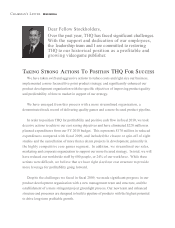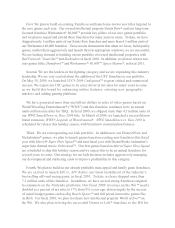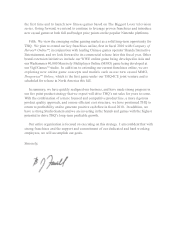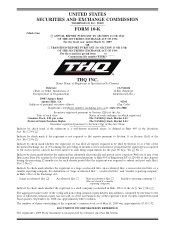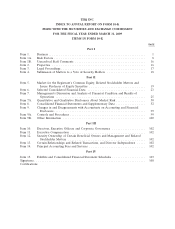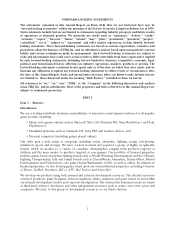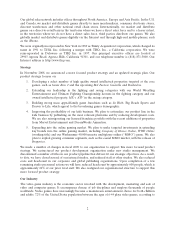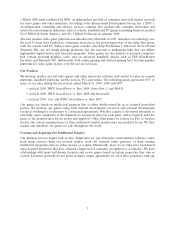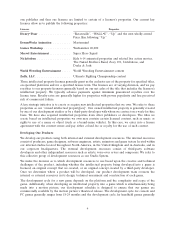THQ 2009 Annual Report Download - page 9
Download and view the complete annual report
Please find page 9 of the 2009 THQ annual report below. You can navigate through the pages in the report by either clicking on the pages listed below, or by using the keyword search tool below to find specific information within the annual report.Our global sales network includes offices throughout North America, Europe and Asia Pacific. In the U.S.
and Canada, we market and distribute games directly to mass merchandisers, consumer electronic stores,
discount warehouses and other national retail chain stores. Internationally, we market and distribute
games on a direct-to-retail basis in the territories where we have a direct sales force and to a lesser extent,
in the territories where we do not have a direct sales force, third parties distribute our games. We also
globally market and distribute games digitally via the Internet and through high-end mobile phones, such
as the iPhone.
We were originally incorporated in New York in 1989 as Trinity Acquisition Corporation, which changed its
name in 1991 to T.HQ, Inc. following a merger with THQ, Inc., a California corporation. We were
reincorporated in Delaware as THQ Inc. in 1997. Our principal executive offices are located at
29903 Agoura Road, Agoura Hills, California 91301, and our telephone number is (818) 871-5000. Our
Internet address is http://www.thq.com.
Strategy
In November 2008, we announced a more focused product strategy and an updated strategic plan. Our
product strategy focuses on:
1. Developing a select number of high quality owned intellectual properties targeted at the core
gamer, such as Saints Row 2 and the upcoming Red Faction: Guerrilla and Darksiders.
2. Extending our leadership in the fighting and racing categories with our World Wrestling
Entertainment and Ultimate Fighting Championship licenses in the fighting category and our
owned intellectual property, MX v. ATV in the racing category.
3. Building strong mass appeal/family game franchises such as de Blob, Big Beach Sports and
Drawn to Life, which appeal to the broadening gamer demographic.
4. Improving the profitability of our kids business. We plan to rationalize our product line in the
kids business by publishing on the most relevant platforms and by reducing development costs.
We are also reinvigorating our licensed franchise portfolio with the recent additions of properties
from Marvel Entertainment and DreamWorks Animation.
5. Expanding into the online gaming market. We plan to make targeted investments in extending
key brands into the online gaming market, including Company of Heroes Online, WWE Online
(working title) and our Warhammer 40,000 massive multiplayer online (‘‘MMO’’) game. We also
plan to exploit growing consumer segments, such as the casual MMO market, with the release of
Dragonica.
We made a number of changes in fiscal 2009 to our organization to support this more focused product
strategy. We restructured our product development organization under new studio management. We
discontinued a number of titles in our product pipeline that did not fit our strategic objectives. As a result,
to date, we have closed several of our internal studios, and reduced staff at other studios. We also reduced
costs and headcount in our corporate and global publishing organizations. Upon completion of a few
remaining studio personnel actions we will have reduced headcount by approximately 600 people, which is
approximately 24% of our prior total staff. We also realigned our organizational structure to support this
more focused product strategy.
Our Industry
The video game industry is the economic sector involved with the development, marketing and sale of
video and computer games. It encompasses dozens of job disciplines and employs thousands of people
worldwide. Video games have increasingly become a mainstream entertainment choice for both children
and adults: 72% of the United States population between the ages of 6-44 plays video games, according to
2


